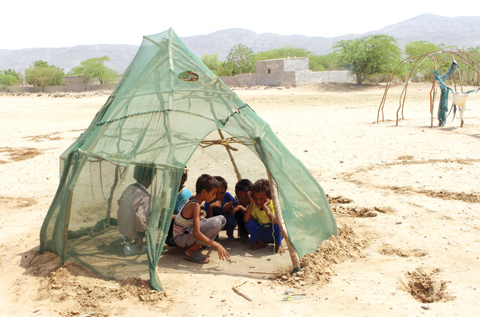Rebels accuse Saudi, allies of targeting food warehouses
 AL HAJJAH, Yemen: Displaced Yemeni children from Hodeida play in a shelter at a make-shift camp in a village in the northern district of Abs in Hajjah province. — AFP
AL HAJJAH, Yemen: Displaced Yemeni children from Hodeida play in a shelter at a make-shift camp in a village in the northern district of Abs in Hajjah province. — AFPDUBAI: Twenty-four Yemenis, including a teenage girl, could face the death penalty in the rebel-held capital Sanaa on charges linked to their minority Bahai faith, Amnesty International said yesterday. The Bahais, among them eight women apart from the girl, face charges which can carry the death penalty in Yemen, including espionage for a foreign state, the London-based rights group said. "We are seeing trumped up charges and flagrantly unfair proceedings used to persecute Yemeni Bahais for their faith," said Lynn Maalouf, head of Middle East research at Amnesty.
"It is particularly abhorrent that some of these men and women could face the death penalty for their conscientiously held beliefs and peaceful activities." Maalouf called for their immediate release, adding that the Iran-backed Houthis should drop the "bogus" charges and "end their abuse of the justice system". Rights groups have warned the Houthis have cracked down on minorities and journalists in the rebel-held capital since 2015, a year after the rebels drove the government of President Abedrabbo Mansour Hadi out of Sanaa.
The Bahai faith, which has an estimated seven million followers worldwide, emerged in the second half of the 19th century. The movement is named after Bahaullah, an Iranian born in 1817 whom the Bahais believe is the latest prophet sent by God. Iran and other states consider the Bahais heretics and suspect many of espionage for Israel, home to a Bahai centre in the northern city of Haifa. Saudi Arabia and its allies joined the Yemeni government's fight against the Houthis in 2015, triggering a conflict that has killed nearly 10,000 people and what the UN calls the world's worst humanitarian crisis.
Targeting warehouses
Meanwhile, Yemen's Houthi rebels accused the government and its Saudi-led allies yesterday of deliberately targeting food warehouses in Hodeida as they resumed an offensive on the rebel-held port city after an 11-week pause. "International food supply warehouses were targeted in Hodeida (late on Monday), a clear sign that there is a plan by the United States, Saudi Arabia, the UAE and their allies to make warehouses and densely populated neighborhoods legitimate targets of their terrorist operations," the head of the rebels' Supreme Revolutionary Council, Mohammed Ali Al-Houthi, said.
There was no immediate confirmation that any aid warehouses had been hit from the World Food Program or other UN agencies battling the threat of famine hanging over millions of Yemenis. WFP spokesman Herve Verhoosel declined to comment on the Houthi statement. The Red Sea port of Hodeida is a vital lifeline for aid shipments to Yemen and the WFP has previously warned that any major fighting could halt food distributions to eight million Yemenis dependent on them for survival.
The rebel leader accused the rest of the international community of not doing enough to stop the coalition resuming its offensive, which it described as "terrorism". "International tolerance of terrorism has only encouraged (the coalition) to plan and deliberately commit crimes," Houthi said. The coalition announced late on Monday that it was ending the 11-week pause it had observed while UN efforts to convene peace negotiations continued. Proposed UN-brokered talks in Geneva fell apart earlier this month when rebel delegates failed to show up, charging that they had not received promised guarantees for their return home afterwards.
Saudi Arabia and its allies accuse the Houthis of receiving arms smuggled from Iran through Hodeida, a charge both Tehran and the rebels deny. The coalition first launched an offensive to retake the city in June, after capturing several of the province's smaller towns. The rebels seized the Red Sea coast along with the capital Sanaa and much of the north in 2014. The coalition intervened in March of the following year, when President Abedrabbo Mansour Hadi fled into exile as the rebels closed in on his last refuge in second city Aden. The conflict has since killed nearly 10,000 people and triggered what the United Nations has described as the world's worst humanitarian crisis.









